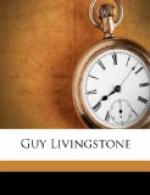“I am surprised to see you here, and so soon,” he answered, coldly; “but I knew we should meet before long.”
“The surprise does not seem too charming,” Miss Bellasys said, pouting her scarlet lip as she threw herself into a deep bergere opposite to the couch on which Livingstone had already sunk down again—he was very weak and unsteady in his movements still.
Was it by chance or calculation that a fold of her dress disarranged displayed the slender foot, with its arched instep—set off by the delicate brodequin, a labor of love to the Parisian Crispin—and the straight, beautifully-turned ankle, cased in dead-white silk? The latter, I think; for Flora knew how to fall as well as Caesar or Polyxena, and had studied her part to its minutest shade. It was by the senses that she had always been most successful in attacking Guy, and she knew that, in old days, no point of feminine perfection had a greater attraction for him.
The temptation, if so it was intended, had about as much effect upon him now as it might have had on weather-beaten St. Simeon Stylites when his penances had lasted twenty years.
After a minute’s silence, during which Flora was gazing intently on her companion, leaning her chin upon her hand, she spoke again.
“I fear you must have been very ill. How—how changed you are!”
Livingstone was, indeed, fearfully altered. The healthy brown of his complexion had given place to a dull, opaque pallor; there were great hollows under the prominent cheek-bones, and his loose dressing-robe of black velvet hung straight down from the gaunt angles of the immense joints and bones. His voice sounded deeper than ever as he replied,
“Yes, I have been very ill, and I am utterly changed. But you must have had something more important to say to me, or you would hardly have ventured on this step.”
She was getting very nervous—inexplicably so for her, who generally kept her head, while she made others lose theirs,
“No. I only wished—” she hesitated, trying to force a smile, and then broke off suddenly—“Guy, do speak kindly to me. Don’t look at me so strangely.”
His answer came, brief and stern.
“I will speak, then. Miss Bellasys, on what authority from me did you venture to interfere in my concerns so far as to intercept my correspondence?”
She tried denial still; it was her way; she always would do it, even when it could avail nothing—perhaps to gain time.
“I don’t know what you mean. I never—”
Livingstone interrupted her, with a curl of contempt on his lip.
“Stop, I beg of you. It is useless to stoop lower than you have done already. I have Willis’s written confession here. Ah! I know your talents too well to accuse you without material proof.”
She raised her head, haughtily enough now. There was something Spartan about that girl. She had such an utter recklessness of exposure—it was in failure that she felt the shame.




